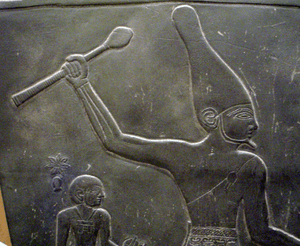Hedjet

| ||
| Hedjet ḥḏt in hieroglyphs |
|---|
Hedjet (ḥḏt) is the formal name for the white crown of pharaonic Upper Egypt. After the unification of Egypt, it was combined with the deshret, the red crown of Lower Egypt, to form the pschent, the double crown of Egypt. The symbol sometimes used for the hedjet was the vulture goddess Nekhbet shown next to the head of the cobra goddess Wadjet, the uraeus on the pschent.[1]
History
The white crown, along with the red crown, has a long history with each of their respective representations going back into the Predynastic Period, indicating that kingship had been the base of Egyptian society for some time. The earliest image of the hedjet was thought to have been in the Qustul in Nubia. According to Jane Roy, "New evidence from Abydos, however, particularly the excavation of Cemetery U and the tome U-j, dating to Naqada IIIA has shown that this iconography appears earlier in Egypt.[2]
Nekhbet, the tutelary goddess of Nekhebet (modern el Kab) near Hierakonpolis, was depicted as a woman, sometimes with the head of a vulture, wearing the white crown.[3] The falcon god Horus of Hierakonpolis (Egyptian: Nekhen) was generally shown wearing a white crown.[4] A famous depiction of the white crown is on the Narmer palette found at Hierakonpolis in which the king of the South wearing the hedjet is shown triumphing over his northern enemies. The kings of the united Egypt saw themselves as successors of Horus. Vases from the reign of Khasekhemwy show the king as Horus wearing the white crown.[5]
As with the deshret (red crown), no example of the white crown has been found. It is unknown how it was constructed and what materials were used. Felt or leather have been suggested, but this is purely speculative. Like the deshret, the hedjet may have been woven like a basket from plant fiber such as grass, straw, palm leaf, or reed. The fact that no crown has ever been found, even in relatively intact royal tombs such as that of Tutankhamun, suggests the crowns may have been passed from one regent to the next, much as in present-day monarchies.

 Small bronze statuary usage with the hedjet, white crown
Small bronze statuary usage with the hedjet, white crown
See also
| Wikimedia Commons has media related to white crown. |
| Wikimedia Commons has media related to red crown. |
| Wikimedia Commons has media related to pschent. |
| Wikimedia Commons has media related to crowns of Egyptian deities. |
- Atef - hedjet crown with feathers identified with Osiris
- Khepresh - blue or war crown also called royal crown
- Uraeus - rearing cobra
- N-red crown (n hieroglyph)
- N-water ripple (n hieroglyph)
References
- ↑ Arthur Maurice Hocart, The Life-Giving Myth, Routledge 2004, p.209
- ↑ Roy, Jane (February 2011). The Politics of Trade:Egypt and Lower Nubia in the 4th Millennium BC. Brill. p. 215. ISBN 9789004196117. Retrieved 16 June 2015.
- ↑ Cherine Badawi, Egypt, 2004, p.550
- ↑ Toby A. H. Wilkinson, Early Dynastic Egypt, Routledge 1999, p.285
- ↑ Jill Kamil, The Ancient Egyptians: Life in the Old Kingdom, American Univ in Cairo Press 1996, p.61